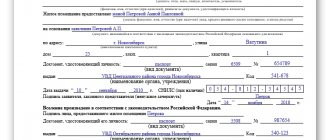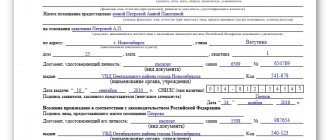Every owner sooner or later is faced with the fact that he is required to provide one or another certificate.
Each of them has its own purpose and is issued according to the requirements of various authorities.
One of the required documents is a certificate for an apartment, issued in Form 12. What is it and in what cases is this document required?
Why is it needed?
Form 9 is an information document containing information about persons registered in residential premises at a specific address, as well as information about persons who have left or been deregistered. Sometimes this form is called a “family composition” certificate.
The form is issued based on the registration card.
The registration card in Form 9 is filled out by accounting service specialists. The registration card is the basis for registering a person in a specific apartment.
Certificate in form No. 9 is needed for :
- sales of residential premises;
- registration of children in preschool institutions or schools;
- employment;
- resettlement of communal apartments;
- accrual of benefits and benefits;
- registration of credit or mortgage obligations;
- for the military registration and enlistment office , when calling up for service (necessary for personal matters).
Form 12 - how it differs from form 9
Certificate Form No. 12 contains information about persons who were deregistered from a particular residential premises for some reason, but have the right to subsequently claim living space. Contains information about minors removed from the register, about persons who are serving a sentence, about persons who are serving in the army or have left due to a temporary move, and so on.
The main difference between the registration certificate of Form No. 9 and Form No. 12 is that Form 12 contains information about those registered in an apartment or other residential premises for the entire period of existence of a particular residential premises. Certificate No. 9 reflects information about registered persons only for the period of residence of the owner of the premises.
basic information
The certificate indicates certain categories of citizens who may potentially qualify for housing in the future, but are currently deregistered due to a court decision or other reasons. These include:
- Persons temporarily in prison.
- Persons missing or declared dead.
- Persons who temporarily left the apartment for treatment or prevention.
- Minor persons who left the boarding school due to loss of parental care.
- Minors who have changed their place of residence.
- Persons called up for military service, as well as some other categories of citizens.
The certificate is valid for an indefinite period and is updated as the number of people living in the apartment changes.
Where to get it: list of organizations
You can obtain Form 9 from the following authorities by submitting the appropriate application in person or through a representative:
- passport office at the actual location of the residential premises;
- in some cities there are departments for moving in and registering citizens;
- the housing maintenance company can also assist in issuing information certificates, Form No. 9, and Form No. 12;
- the certificate can be ordered using the State Services website;
- It is also possible to receive certificates by mail;
- The MFC also accepts applications and issues this certificate.
Through the Internet
As mentioned earlier, a registration document can be obtained using the “State Services” service on the Internet. In order to apply for a document, you must log in to the official website of the portal, select the “Categories” section. Next, you need to fill out the following fields.
On the website (on State Services) there is a sample of filling out an application, a form, and you can also apply with us. ↵
Through housing office, MFC, etc.
You can obtain Form 9 by contacting the authorities that perform the duties of maintaining residential premises (housing office) or the authorities involved in maintaining various types of records (passport office, MFC).
You can obtain a document with registration information by personally contacting one of the indicated authorities, providing the specialist with all the necessary documents. The certificate is also issued to representatives of the owner. In this case, it is necessary to prepare a power of attorney in advance, which will be certified in the prescribed manner.
If for one reason or another it is not possible to appear in person at one of these bodies, then you should resort to. In this case, you need to submit your own application from the Internet, fill it out, attach a package of documents to the form, and send it by registered mail with a list of attachments. The application must indicate how to send the response.
Where to get an archived certificate of form 9 and 12
In real life, it happens that information is needed not about the persons currently registered in the apartment, but information about all persons who were registered and deregistered throughout the entire operation of the apartment, house, and so on. Such cases include:
- the process of privatization of an apartment (to prove the non-use of the right to privatize residential premises);
- the process of inheritance (actual acceptance of property);
- An archival certificate may be required by the buyer when selling an apartment in order to ensure that there are no registered persons in the living space, as well as the absence of persons who are not temporarily residing but retain the right to reside in the apartment (for example, prisoners).
Archival certificates are issued at the passport office at the location of the apartment or private house. However, preparing this document will take longer than preparing a simple Form 9.
You can also try to get an extract from the government services website.
General classification of procedural law
We are talking about incomplete and complete appeal. Let's start with the first one. The general meaning here is that the process of proof will be focused on the first instance. In fact, the appellate court has 3 main tasks here:
- Checking the decision of the first instance.
- Studying factual material.
- Making a decision (on the merits).
In addition, it will most likely not be possible to dilute the case with new evidence in the appellate instance. However, there is an exception to the rule. Still, in certain situations, new evidence can be introduced. But the law strictly limits this. So it cannot be said that this opportunity is being fully used.
Incomplete appeal does not exist in all countries. For example, in Germany and Austria this mechanism is used for civil proceedings.
But re-examination of the case through the appellate authority is not always allowed. Here it must be said that there is a place for such situations only under certain conditions:
- The law allows for the examination of evidence that was ignored.
- The acceptance of unrecorded evidence is regulated.
Plus, this is still not enough. It is important that the very fact of ignoring evidence becomes the reason for making the wrong decision. By wrong decision we mean an unreasonable or illegal decision. In this situation, re-examination is possible. And at the same time, the appellate court will study only new evidence. And if a circumstance that changes the situation upside down is found, you can count on a different verdict.
With a full appeal the situation is slightly different. The fact is that the case is being examined simply anew and on its merits. In fact, a full appeal is a complete review of the case. At the same time, the decision and its correctness will also be checked in the first instance. The full appeal is found in:
- England.
- Italy.
- France.
By the way, full appeals, in their classical definition, existed in pre-revolutionary Russia. The main purpose of a full appeal is to correct all errors made by the trial court and omissions (of the parties).
Moreover, in the classic full appeal scheme, the parties may also introduce new evidence that will have to be taken into account. Because in the appellate courts, the case, or rather its factual side, is studied completely. From start to finish.
In addition, it will not be possible to initiate appeal proceedings without a decision at first instance. Moreover, this decision must be subject to doubt on the part of the participants in the case itself. And even then, the point is not so much in the decision itself, but in the suspicion that it:
- Has no justification.
- Is not legal.
Suspicions and doubts here can be expressed in different ways. But to review the case, a system of arguments must be provided. If the appellate court has already started proceedings based on the complaint, then the case will be considered anew.
In modern Russia, appeal proceedings are carried out in the manner that we described above. Those. a higher authority than the one that made the initial decision will check the final decision. If there are grounds, the appealed decision will be canceled and a new one will be issued. If there are no grounds, the appeal will confirm the initial decision.
In modern Russia, individual procedural issues are not considered during the appeal process. On the contrary, the consideration takes place on the merits of the case, in the overall picture. In addition, the courts involved in appeal procedures are represented as follows:
- Arbitration courts (appeals).
- Courts of general jurisdiction (appeals).
- Courts of the constituent entities of the Russian Federation.
- District courts.
Sample of what it looks like
The appearance of the residence registration certificate can be assessed in the photo.
Click on the photo of the form to enlarge.
The document must contain the following information:
- Full name, date of birth and year of birth of the person to whom the form is issued;
- Type of registration (permanent, temporary), as well as date of registration;
- Address at which the person is registered (street, house number, apartment number are indicated);
- The full names of all persons registered in the residential premises are indicated;
- Grounds for registration of persons;
- Information about the living space (area, number of rooms);
- Date of issue, signature of the specialist.
Contract of sale of an apartment
We, the undersigned: citizen Semyon Alekseevich Smirnov, born December 24, 1982, passport: series 50 03, No. 150345, issued 04/10/2003. Department of Internal Affairs of the Oktyabrsky district of Novosibirsk, division code 512-054, registered at the address: Novosibirsk, Truda street, house No. 6, apt. No. 15, hereinafter referred to as “Seller”, on the one hand, and citizen Petr Nikolaevich Bykov, born March 12, 1979, passport: series 50 05, No. 280567, issued 07/05/2005. Department of Internal Affairs of the Central District of Novosibirsk, division code 512-052, registered at the address: Novosibirsk, st. Mira, house no. 7, apt. No. 34, hereinafter referred to as “Buyer”, on the other hand, have entered into this agreement as follows:
A preliminary agreement is not subject to registration, since it only determines the intentions of future participants in the purchase and sale transaction, but at the same time, civil law provides for the possibility of one of the parties to the transaction going to court, demanding to force the conclusion of the main and final agreement if the other party avoids fulfillment of their obligations.
Required documents
Only the following persons can obtain a certificate of permanent or temporary registration:
- The person who owns the property;
- A person who is registered in a residential premises (only during the period of its registration);
- Legal representative of a minor registered in the apartment;
- Representative of the owner of the residential premises.
To obtain Form 9, you need to submit the following documents to the specialist:
- Application of the appropriate sample;
- Passport or other document that proves your identity.
- If the documents are submitted by a representative, then a power of attorney certified by a notary is required.
Consignment note: TTN form (form 1-T) free download
For the driver, in accordance with the traffic rules, the TTN is the main document that must be presented for the cargo when checked on the road by traffic police officers. In the absence of this document, the entire cargo may be seized until the circumstances of the delivery are clarified.
In 2021, the 1-T form of consignment note , approved back in 1997, is being used on the territory of the Russian Federation. After approval, no other changes were made to the document form, but confusion may arise due to the adoption of the consignment note (Government Decree No. 272 dated April 15, 2011).
Deadlines for receiving and validity of the registration certificate, price
As a rule, a registration certificate is received within two hours after you personally appear at the authority and submit all the necessary documents.
If it is necessary to obtain an archival certificate, then the authorities will need several days to check all the data about the persons who were registered throughout the entire period of operation of the premises.
If the application for a certificate was drawn up using the State Services website, then be prepared for the fact that the preparation time for the document will be about 30 days.
The validity period for Form 9 has not been established by the state. This means that from the moment of receipt its shelf life is not limited to a specific time . However, there is an exception. Form 9 is valid if the registered person has not been deregistered from the register in the residential premises, or, conversely, a new person has not been registered.
The registration certificate is issued free of charge. Therefore, remember that service employees ask you to pay the state fee, this is a reason to contact the prosecutor’s office or higher authorities.
Possible difficulties and nuances, reasons for refusal
There are cases where applicants are denied a certificate, citing the refusal as the presence of unpaid utility bills. Experts explain that it is necessary to repay debts, and then only the right to receive a document can be exercised.
Remember, this approach to considering applications is considered illegal and is recognized as the arbitrariness of an official.
If you encounter such a case, you must request a reasoned refusal in writing and submit it to the supervisory authorities.
Thus, certificates of forms 9 and 12 are included in the package of documents when resolving various situations, and are also used to keep records of the location of persons. In turn, the process of obtaining these certificates is quite simple.











